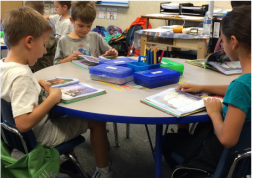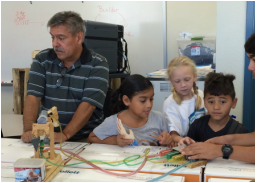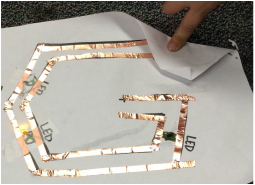- John McCandless STEM Charter School
- Academic Program
Academic Program
-
The John McCandless STEM Charter School academic program consists of three key components:
1. Specific Core Instruction: Reading, Language Arts, and Mathematics
2. Project Based Learning with a focus on Science and/or Social Studies
3. STEM Specific Studies taught through "Genius Hour" & Electives
Technology is used throughout all curricular components.
Core Instruction
Literacy is fundamental.
Literacy is the ability to read, view, write, design, speak and listen in a way that allows a person to communicate effectively. We believe that the power of literacy lies not just in the ability to read and write, but also in a person’s capacity to apply these skills to effectively connect, interpret and discern the intricacies of the world in which they live.
Mathematics:
Mathematics is important in everyday life, allowing us to make sense of the world around us and to manage our lives. Using mathematics enables us to model real-life situations and make connections and informed predictions. It equips us with the skills we need to interpret and analyze information, simplify and solve problems, assess risk and make informed decisions.
Project Based Learning
Research confirms that Project Based Learning (PBL) is an effective and enjoyable way to learn and develop the deeper learning competencies required for success in college, career, and civic life. PBL helps address standards. The Common Core and Next Generation Science Standards emphasize real-world application of knowledge and skills, and the development of success skills such as critical thinking/problem solving, collaboration, communication in a variety of media, and speaking and presentation skills. PBL is an effective way to meet these goals.
- PBL makes school more engaging for students.
- PBL improves learning.
- PBL builds success skills for college, career, and life.

"Genius Hour" & Electives
Genius Hour and Electives are for students to study a STEM-based topic in depth. Topics that have been offered include an introduction to robotics, solar powered cars, bridge building, STEM fairy tales, cartography, electronic circuitry, coding and introduction to light and color.
The 6 Principles Of Genius Hour
1. Sense of Purpose: Students must find a sense of purpose in what they study, make sense of, and create.
2. Design: Students are allowed to design as part of their learning experiences.
3. Inquiry & Navigation: Through surveying possibility, navigating content, and gathering information, students make sense of ideas important to them.
4. Create: Whether students “make,” publish, design, act, or do, “creating” is core to Genius Hour. There is always a visible product or function of the learning.
5. Socialization: Students connect with teachers to plan, peers to produce, and experts and community members to establish a sense of purpose for their work.
6. 80/20 Rule: The structure of most Genius Hour learning. We provide an “hour,” four days per week.

